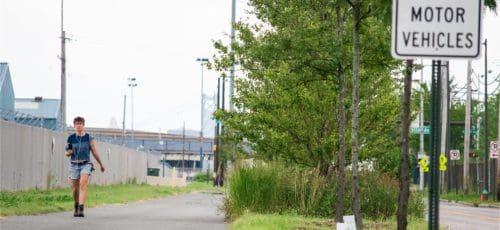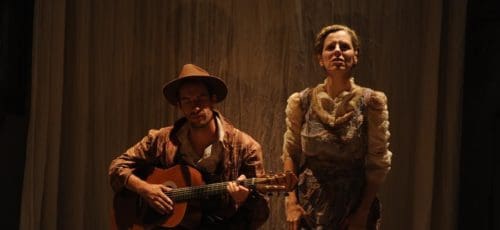Changing Perceptions of Historical Truths: Talkin’ Joe Hill with director Adrienne Mackey
“There is a beautiful stillness that is oppressive.”
For the 2013 Fringe Festival, Adrienne Mackey and her creative cohort Bradley Wrenn are leading Swim Pony Performing Arts in the revival of their 2006 Philly Fringe hit The Ballad of Joe Hill. The show, while retaining its original infectious spirit, is getting a major updating, thanks in no small part to historical evidence surfacing that changed the creators’ perspective of Joe Hill’s story. Adrienne and Bradley had for years wanted to revisit this show that helped form Swim Pony’s identity and performance aesthetic. Partly this was a love for the show, but it has also been their desire to revisit the show with the artistic maturity—and confidence—they’ve acquired in the years since the original production. The following is an excerpted interview we had with Adrienne in the spring, when the company was embarking upon the rehearsal and (re)creation process.
FringeArts: Why is the show title The Ballad of Joe Hill?
Adrienne: The show is named after a song of the same name written after Joe Hill was executed. The lyrics of the first verse:
I dreamed I saw Joe Hill last night
alive as you and me
Said I, “But Joe, you’re ten years dead.”
“I never died,” said he.
“I never died,” said he.
It helped inspire the image of the female narrator seeing a kind of ghost of Joe Hill many years after his death.
FringeArts: How did you stumble upon his story?
Adrienne Mackey: We originally heard of Joe Hill through Utah Phillips—another folk singer and Wobbly, or IWW member [Industrial Workers of the World]—who passed away just a few years ago. Hearing the story, the idea of Joe Hill dying for a larger cause just kind of stuck. It was hard for us to understand how, and why, someone would do such a thing. We began to look more into the music Hill wrote and read up on the story. The intricacies of the case seemed so of the moment Hill was living but eerily similar to today.
FringeArts: When did the show begin to form for you?
Adrienne Mackey: It was when we started playing with the vaudeville style that the two aspects of the show—the simple naturalism mixed with the bouncy cartoonish stuff—that the picture of what we’d be doing started to clarify. And then when we secured Eastern State the whole thing really started to form an image.
FringeArts: How will the show be evolving in this remount?
Adrienne Mackey: The narrative will be different based largely on expanded research about Hill’s guilt. Beyond that, the historical content will be much the same, but we may emphasize different aspects. In terms of approach, we will definitely be changing around the content to clarify the history content without some clunky devices we used in the first version. Like many original works, it was really once we saw the thing in performance for the first time that we saw which characters and scenes were truly vibrant in the first one, and our hope is to pull out more of these.
We’re also looking at bringing in more of the media presence, in the sense of newspapers of the time period, and how it informed the climate that surrounded Hill as he was convicted and going into trial. Like many major trials today, the media helped create an environment that whipped the public into a fervor.
FringeArts: What’s it like coming back to the show the second time around?
Adrienne Mackey: I think that too often the pressure to create new work ends up making devised work looking scrappy or unpolished compared to traditional scripted shows. Devised shows can be as narratively complex but need more than one go round to get there. If you think about the way a “normal” playwright works, they go through many drafts before a show is finished. The same is true in my process but that first draft goes in front of an audience. So a scene or transition that’s clunky becomes obvious, in the same way that it would in a developmental play reading, but it takes a lot more time to marshal the resources to go back into rehearsal when a work is ensemble built.
I think the trade off for that difficulty though is that when you do get to the work again, you have a cast that understands the show from the ground level up. They have invested in the work because they can see it from the bird’s eye level and not just their singular character. It’s very much in line with the IWW philosophy of labor—the idea that the work should be collectively owned by those that create it. I feel that way with my designers and performers, that we are all the mind behind the show and that we should all feel like it is an extension of our artistic vision.
FringeArts: Have you started rehearsals?
Adrienne Mackey: We have started rehearsals and it’s been awesome. It feels like coming back home in an interesting way. The new folks have slipped into a comfortable rhythm. We begin each day with singing together and then pick a few topics to explore. It’s an easy and open process of exploration right now. Brad and I have been excited to see how much everyone is bringing to the table. The new folks have brought some really great new material, a vaudeville comedy routine between the Utah governor and the dead body of Joe Hill—sounds macabre, which it is, but totally hilarious and terrifying—to name one example.
We’ve got some new music that we’re adding into the mix so it’s been fun to learn that all together. We’ve also been watching these amazing documentaries about “old timer” IWW members and playing with some impressions of the different guys that were part of the movement. We’ve also had designers and our writer in the room, so it’s been a full project approach.
FringeArts: Can you touch on the idea of changing perceptions of historical truths?
Adrienne Mackey: For me, the biggest thing is trying to get away from the idea of a single truth. The changing styles and surprising shifting back and forth of style and time period is done intentionally to give the audience a sense of all the variety of perspectives. One of the effects we’d like to play with is to put the audience through the experience we had—that of some of the material bringing you to one conclusion on Hill’s guilt—and then reveal other aspects of the story that lead you to the complete opposite conclusion. It’s been amazing to me how thoroughly different my sense of the story is based on the new research that’s been done since we did the first show. It just goes to show how perspective is so important in how we make meaning of the past.
FringeArts: The show is returning to Eastern State Penitentiary—why there?
Adrienne Mackey: Eastern State is so crucial because it drives home the sense of being in the shoes of Hill—trapped and surrounded by an entire system that controls where you are and what you do. There is nothing like seeing the massive structure of the prison cell block that we perform on to drive home the reality of what it must have been like to sit in that tiny space for months just waiting for someone else to decide whether you live or die. There is a beautiful stillness that is oppressive. And it creeps in on the edges of our play—you can feel the clowns of the show, sort of like Hill’s humor made manifest—fight to push out that sadness to keep spirits high.
FringeArts: You have talked about how the issues at stake in Joe Hill’s time, and thus this work, seem like the same issues as today, particularly in wealth disparity. What particulars from his life and story of the times did you find especially striking?
Adrienne Mackey: The fact that his case was a national media frenzy that divided the county, for one. Half of the country felt a kinship with Joe, that an attack on him was an attack on them, the other half [felt] that if he were freed it would spell disaster for the country. It feels incredibly familiar.
And his access to a balanced legal system was affected hugely by his income also strikes me when I think about fairness in the criminal justice system today. It’s pretty clear that if Hill had the attorneys, whom he eventually secured for his appeal, during his first trial it’s much less likely that he would have been convicted. His first lawyers were pretty incompetent and missed so many basic things that could have changed the course of his history.
That and the fact that Hill’s judge was friends with the newspaper mogul who was publishing the defamatory articles against him, both of whom were in the same country club with the prosecuting attorney, members of the pardon board, and the governor who had strong anti-IWW views and who was known for strike breaking and denied [Hill’s pardon]. It says a lot about how wealth and status works in this country. On paper Hill had the same trial as anyone else, but how can that chain of connectedness not have an impact on him?
FringeArts: Can you talk about Joe Hill as a songwriter?
Adrienne Mackey: Hill had a classic sense of Scandinavian humor, a bit wry, dry with a touch of pessimism. He was great at taking the low status he was according and using it to poke at those in power. He was pointedly simple in his style so as to make it [a song] easy to learn by just about anyone. As Hill said, pamphlet, no matter how good, is only read once. But a song is sung over and over again. His lyrics are catchy and fun to sing. That goes a long way to helping to make his cause accessible.
FringeArts: What clicks with you about Joe Hill to keep coming back to him?
Adrienne Mackey: I think actually in some ways it’s the inscrutability of Hill that draws me to him. He was a stubborn guy, a funny guy, but a shy and somewhat hard to understand person. He did an amazing thing, giving his life up, in some cases seemingly going out of his way to deny himself the chance to live. He stuck to principles that are often hard for me to understand and how and why he did what he did. The fact that he doesn’t fit our usual picture of a hero is intriguing and complex and makes me what to know him more.
Thank you, Adrienne!
The Ballad of Joe Hill
Swim Pony Performing Arts
Sept 5–15, click here for show times and tickets
Eastern State Penitentiary
2027 Fairmount St, Philadelphia






